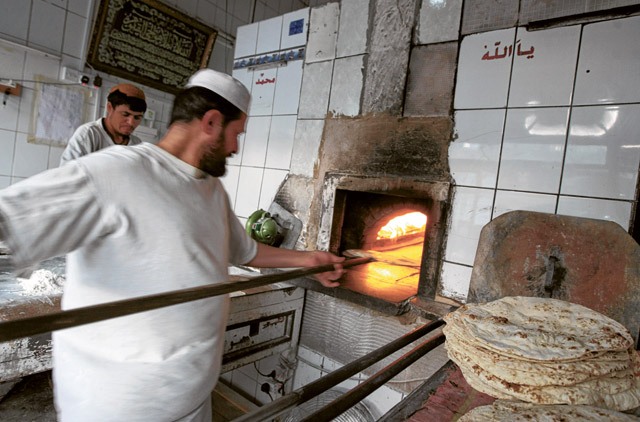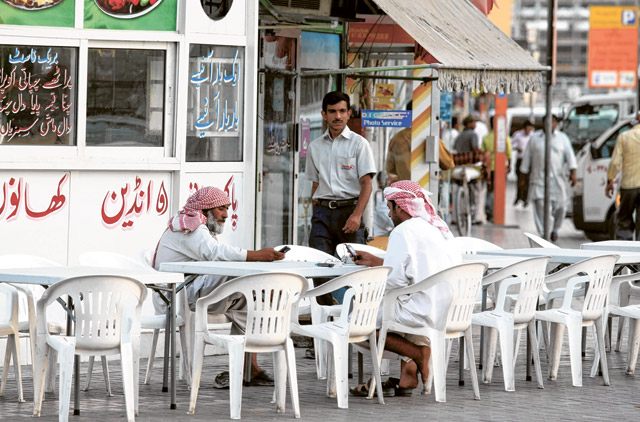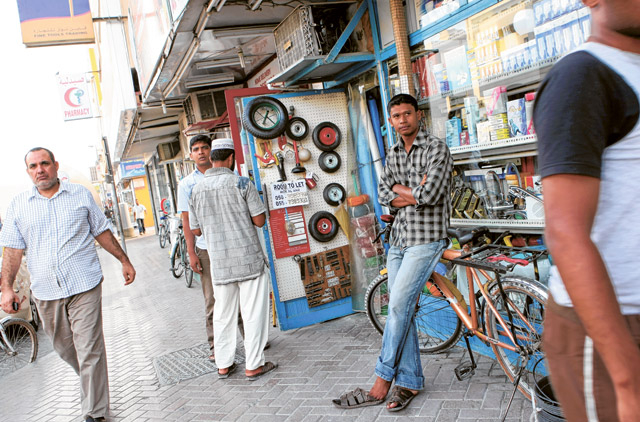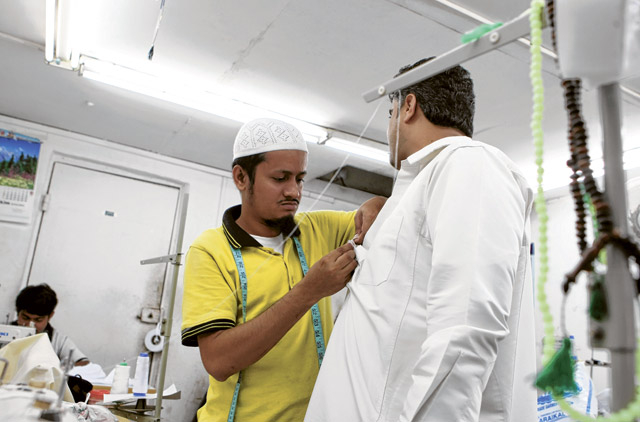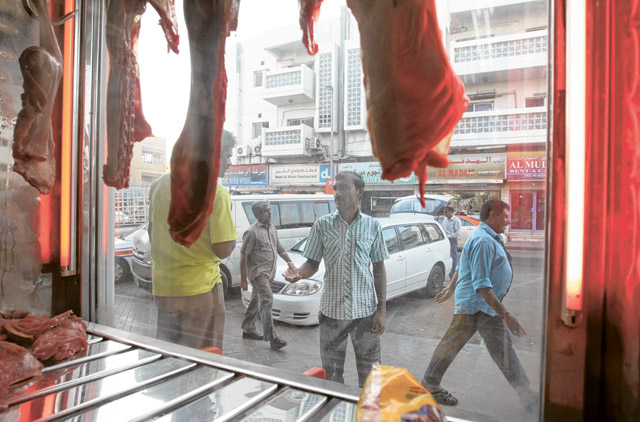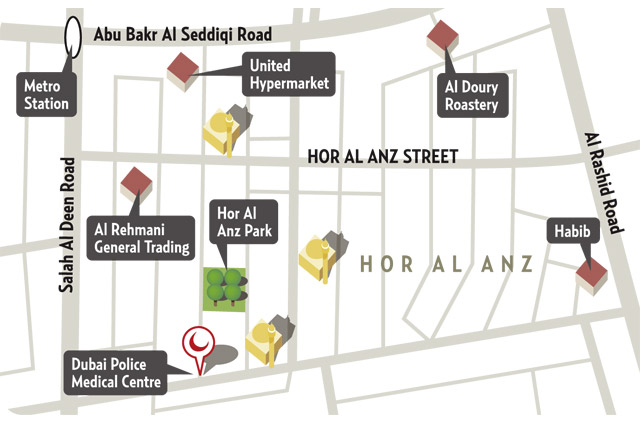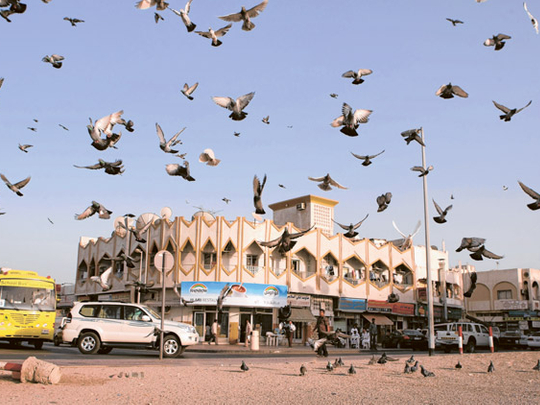
Hazrat Shah recently moved his shoe shop to Hor Al Anz from Deira because of the cheaper rent.
The Pakistani from Quetta has a shop appropriately named Al Pakistani and sits among the rows of shiny black and brown shoes. Incongruously, the other thing he also sells is miswak, twigs from the Peelu tree which have an astringent taste when chewed on and is used by Asians and Africans to clean their teeth.
He is at first caught off-guard as to why anybody would be interested in him or his shop, specially a Western woman photographer, but then he opens up when this reporter speaks to him in Urdu.
He has been running a shoe shop in Dubai for the last 21 years. Shah was forced to move to Hor Al Anz as business has been slow in the recent past and he could not afford the rent in Deira.
Shah wears a traditional Pakistani dress — a loose, flowing drawstring pants (historians tell us that the fearsome Turkish warrior-horsemen wore similar baggy trousers) and a shirt that comes down to his knees.
Assuming that the shoes are made in Pakistan, we ask him where in Pakistan they are manufactured. "I buy these from a bazaar next to the Gold Souq," he said.
Hor Al Anz is a huge district near Dubai Hospital (to reach the district you have to take the Shindagha Tunnel) and is populated largely by Pakistani and Bangladeshi expatriates.
Forced bachelor
There are very few families here and the area is dominated mostly by "forced bachelors", those who have to leave their wives and children behind in their home countries because they cannot afford to bring them here.
Megan, the very cheerful photographer of Gulf News, attracts a lot of interest from the men because of her smile and also because of the mean looking camera she was carrying. The men shyly smile at her when she clicks away at high speed as the colourful district comes to life after the afternoon siesta. A man on a bicycle with a ferocious beard nods at her.
We reach Hor Al Anz at 4pm as shops start opening and people begin to relax on plastic chairs on the pavement drinking tea from plastic cups to perk them up and get through to the rest of the day.
A pretty, tiny Pakistani girl watching a flock of pigeons feeding on grain strewn on the pavement, catches Megan's eye. Her keen eye then latches on to a lone Arab man sitting on a stool. He wears dark glasses and looks like a cast member of the movie Men in Black, but wearing a white jalabiya, a traditional Egyptian garment.
She ducks into a salon where a grinning, toothless boy is getting a haircut. He giggles and has great fun when she gets close to him with her camera. "You are the sweetest guy I ever met," she tells Mohammad Saleh, who obviously does not understand a word she was saying. His Egyptian father said the gregarious boy is five years old.
As we walk along the length of Hor Al Anz street, we were overwhelmed by the activity around us. Afghan bakers were busily kneading and patting the stretched out dough on the sides of an oven, baking the flat naan for the hungry people who will flock here before dinner.
A sweets vendor was busy wrapping up potato samosas in paper for customers who wanted something to munch on with their tea.
A mechanic was stripping a wire with his teeth and trying to fix a dead battery while a cook was spearing chunks of marinated chicken on to a skewer. The street was full of uniformed taxi drivers streaming out from their rooms in the alleys, still groggy after their nap.
People here sleep six or 10 to a room and pay about Dh2,000 monthly rent for a room.
Zawar Ali from Pakistan drives a taxi for Arabian Taxi company. He drove a taxi in Abu Dhabi for 10 years before moving here. For him life seems to be "good'" He said he gets a good number of passengers a day. His rent was good, he said, as he pays Dh300 for the room which he shares with six others.
"The lane from here to that shop is Pakistani. Behind us it is Bangladeshi. In the middle it is Filipino. But there is also a lot of kachra [rubbish] here," says Shahadul Hussain, a chubby-faced young Bangladeshi man.
Asked what he meant by "rubbish", he ignores the question. Curiously we do not see any women in this area during daytime.
Here, video libraries have colourful posters of Bollywood movies, We Are Family and Dabaang pasted on the windows. Hollywood action and crime movies also seem very popular here.
Irshad Ahmad sits in a travel agency with a sign outside advertising visa change trips to Kish, the infamous Iran-ian free zone island across the Gulf waters, where many expatriates have visited to get their residency status in the UAE changed. Not many Indians or Pakistanis go to Kish nowadays, he said.
He used to run a garment shop in Pakistan but came here because the business went bust. "People don't come to the travel agencies any more because booking on the internet is so easy," he said. "The only people who come to us are the uneducated ones. You know this is a working class neighbourhood," he said. Two men then walk and he excuses himself.
Buses ply through this busy district of bachelors. A C3 bus zig-zags through the area and heads towards Karama. Further down the road, a Metro station is being constructed and when completed will make this an even busier part of Dubai.
Hor Al Anz is a densely populated district in the east of Dubai in Deira and lies at the intersection of Salah Al Deen Road and Abu Bakr Al Seddiqi Road. It is sub-divided into the main Hor Al Anz which is not far from Dubai Hospital, and Hor Al Anz East, which stretches towards Al Ittihad Road leading to Sharjah. It is a working place neighbourhood and is inhabited mostly by Pakistani and Bangladeshi expatriates.
Top picks
1 Mosques: The ‘Big Mosque' is on Hor Al Anz Street near the Dubai Municipality branch office. ‘By the Grace of God we have a number of mosques in this area'—resident.
2 Restaurants: There are a host of eating places here with names like Pak Rose, Jilani, Saif, or Sind Durbar, with the picture of lamb or a plate of saffron rice with chilli-hot red chicken legs
3 Schools: There are no schools in this working class neighbourhood
4 Groceries: There are groceries here every few metres with quaint names like Island Deer Grocery
5 Supermarket: United Hypermarket has stiff competition from the groceries
6 Salons: For some reason there is a men's salon adjacent to every lane in this district.
Do you live in the Hor Al Anz area and have a story to tell us? What is your opinion of the changes that took place in your area? Do you live in another neighbourhood and would like to tell us about it?


